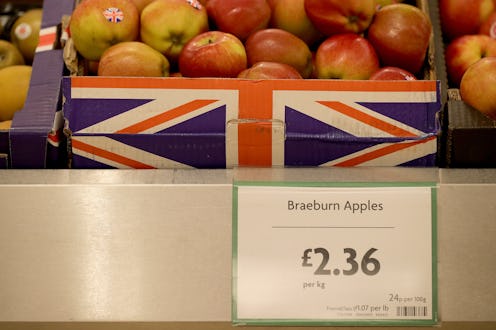News
Why Europe Just Banned American Apples
You may want to take another look at that apple you're eating. In late March, Europe effectively banned American apples from being imported and sold, due to the use of a controversial chemical called diphenylamine, or DPA for short. Having already banned the use of DPA on local apples in 2012, the European Food Safety Authority went a step further, imposing a ban on any imported apples with more than 0.1 parts per million of DPA. But the average amount of DPA on most American apples is four times greater than that — meaning American apples are, for all practical purposes, no longer sellable on European shores.
The question of whether DPA poses a health risk to humans is not entirely clear, owing to the complicated nature of the concerns. While the chemical itself is not thought to be dangerous, it can potentially break down into carcinogens known as nitrosamines, which most certainly are. The EFSA, understandably curious about this, requested more information from the chemical industry as to the risks involved.
What they received was, according to a report from Environmental Working Group , "one study that detected three unknown chemicals on DPA-treated apples," but it was unable to determine whether the chemicals in question were nitrosamines from broken-down DPA. Apparently finding that any unacceptable level of uncertainty, the EFSA made the move to start cutting DPA out of European life.
So what is DPA? Basically, it's a chemical applied to the outside of apples, which prevents "scalding" — brown spots that appear on the outside of the fruit — while they're kept in storage, before they hit the shelves. According to the aforementioned EWG report, some 80 percent of American apples test positive for DPA residue, and of those the average reading is 0.42 parts per million.
Our own Environmental Protection Agency, for what it's worth, thinks the Europeans are being altogether too nervous about this — they set the permissible levels of DPA at a whopping 10 parts per million, 100 times higher than the EFSA's limit. And you shouldn't expect that to change anytime soon — the EWG report suggests efforts to reach out the EPA on this issue haven't proved fruitful:
Earlier this year three scientists in the U.S. EPA Office of Pesticides, which is tasked with pesticide safety reviews, told EWG they were unaware of the new European ban and import restrictions. They said the agency had no plans to reassess DPA safety in light of the European actions.
So basically, your apple might be fine. Or, it might be really bad for you. Or, a little bad for you? If we can all agree on anything, it's that some more research would be a great place to start.
